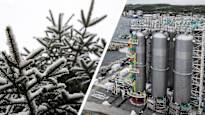According to a European report, the pharynx should be increased by price control. According to researchers, strengthening the throat is essential for the achievement of EU emissions targets.
The European Scientific Climate Council will bring a reminder to the Finnish carbon sinking debate on the role of the pharynx in the EU climate policy.
In order to support quick emission reductions, emission removal, ie natural and technical carbon sinks, says the recent report states. Separate binding goals are recommended for depreciation to promote investment and technological development.
According to researchers, strengthening of the throat is essential due to the reduction in the EU carbon sink and to achieve the EU emission targets.
The EU must urgently stop and reverse the ongoing decrease in soil carbon sink and ensure sustainable biomass procurement and use, the Council obey.
For the land use sector, the report recommends new pricing tools to reward landowners for carbon recovery and pricing emissions to turn the decline in land use throat into growth.
Thus, the Council is on the same line as a number of economic policy organizations that have repeatedly demanded price control for forest climate action. So have done International Currency Fund IMF, Economic Policy Assessment Council, Audit Office mixed Business Research Institute.
According to the Council, the fastest means are soil carbon bonding, marshes’ restoration, afforestation, improved forest management and agrometing economy. Carbon recovery from production facilities at the ends of the barrels is not yet ready for production.
Extended emission responsibility for use
The report proposes the introduction of extended emissions responsibility. It would require current emissions to participate in the elimination of greenhouse gases, which would help achieve net-negative emissions in the EU.
The Council recommends that the EU sets separate legally binding objectives for emissions deductions, permanent depreciation and temporary depreciation.
It recommends that the EU will increase coordination, increase investment and improve planning for the development of EU CO2 transport and storage infrastructure, while ensuring equitable access, fair transition and climate durability.
In 2021 to support the European Climate Act European Scientific Climate Council Provides the EU scientific information and advice on climate change, evaluates policies and identifies action to achieve the EU climate targets. The Council consists of 15 independent parents of scientific experts representing a wide range of disciplines related to the subject.
